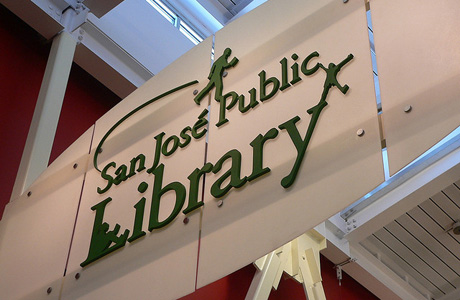The San Jose Public Libraries Commission wants the city to extend a parcel tax to avoid laying off 53 of its 314 full-time library employees. The parcel tax, which expires next year, pays for 19.3 percent of the current year libraries budget.
“Losing the funds would be catastrophic for the library system,” Jean Lee, libraries commission chair, writes to the Rules and Open Government Committee.
Lee also asks the city to consider opening San Jose’s four newest libraries seven days a week to quell accusations of unfair bias.
“Residents also want the branch libraries to return to a full seven days a week schedule,” she writes. “The current reduced schedule has caused problems and has led to claims of discrimination and unfairness, especially by those whose branches are closed on Saturday.”
San Jose built new libraries and expanded existing ones with $212 million in bond money approved by voters in 2000. But with years of budget deficits, the city remained unable to staff four of them. Until recently. The Bascom Library and Community Center celebrated its grand opening just last weekend.
Still, future funding uncertainties worry library leaders.
“We deeply appreciate that the city is opening the four currently closed branch libraries this year,” Lee says. “We hear a lot of excitement about this from residents served by these branches. We also hear concern that the city must adequately fund and operate these four branches and the whole library system.”
More from the Rules and Open Government Committee agenda for February 27, 2013:
• As the largest city in the most diverse county in the state, San Jose is in a unique position to contribute to the national immigration debate, particularly to encourage lawmakers to widen the path to citizenship.
Councilmembers Xavier Campos and Don Rocha signed a memo that spells out support for immigration reform. The memo could go before the City Council, which would then decide whether or not to formally put San Jose’s name on a resolution sent to national elected leaders.
“For the first time in years, it appears that comprehensive and effective immigration reform may be possible,” the memo says. “At this moment or opportunity, San Jose, perhaps more than any other American city, has an important and timely story to tell about immigration.”
The two councilmembers argue that the city’s successes are largely to San Jose embracing its immigrant population,
“As the capital of Silicon Valley, we are one of the most diverse and immigrant-rich cities in the country and one of the most prosperous and innovative,” Campos and Rocha say. “This isn’t a coincidence: our embrace of immigrants is an essential strength of our economy and our culture. San Jose exemplifies the potential for comprehensive immigration to be a positive force in the continued growth and progress in America. Now is the time for the Council to use our story on immigration and our ability to find innovative solutions as a model for San Jose, California and the nation.”
To remain competitive, San Jose has to attract and keep hold of the best workers, regardless of where they’re from, the accompanying resolution states.
A University of Southern California study found that immigration reform would add $16 billion to the California economy. In Santa Clara County, immigrants account for 44 percent of economic activity. Sixty-four percent of the science and engineering labor force in Santa Clara and San Mateo counties were born abroad. Between 2006 and 2012, immigrants founded 44 percent of Silicon Valley start-ups, according to a Kauffman Foundation study.
Plus, the overwhelming majority of workers who harvest food in California are foreign-born.
Immigrants are more likely to start and run their own business, and small businesses drive 80 percent of the economy, those same studies found. The Small Business Administration says that immigrant business owners generate $67 billion income in the U.S.
• Mayor Chuck Reed and each councilmember voted on their highest budget priorities for the upcoming fiscal year in a recent study session. Only two topics garnered six votes: Police and fire staffing and response times; and how to hire and keep employees in the San Jose Police Department.
Other topics, though they didn’t get as many votes, will also be considered as the council discusses budget priorities.
• David Wall, whose biting prose is a regular fixture on the public record, cites coverage of the Supervisor George Shirakawa scandal in the Merc and “San Jose Insider”—presumably us; thanks, Dave—and calls for the city to remain “squeaky clean when using the public’s money for feasting and merriment.”
City officials, such as Councilmember Campos and Norbert Dueñas, an assistant city manager, each cut checks to reimburse the county for Shirakawa’s spending, which included drinks at P.F. Chang’s. Wall says those reimbursements prove that city officials were complicit in the supervisor’s wrongdoing.
WHAT: Rules and Open Government Committee meeting
WHEN: 2pm Wednesday
WHERE: City Hall, 200 E. Santa Clara St., San Jose
INFO: City Clerk’s Office, Kathy Carrillo, 408.535.1254


Geez, Chuck, Pete, and Pier seemed like they were in an exceptionally foul mood after speakers came forward to support this Memo by Councilmembers Campos and Rocha. Ironic that Pete thinks the council should not be a bully pulpit for immigration reform, yet it is ok to use the council as a bully pulpit if it is for pushing his issues.
Thanks for reminding me that we pay a parcel tax for libraries in San Jose. I looked at my tax bill. It’s $29.12 this year.
This parcel tax money has to be spent on libraries, but that doesn’t mean that it’s “in addition” to whatever the Council decides to spend on libraries. The cynic in me makes me believe it’s just another piggy bank that the Council can raid.
I think we should see if San Jose can form a special district for libraries, or join the Santa Clara County Library District.
http://en.wikipedia.org/wiki/Santa_Clara_County_Library